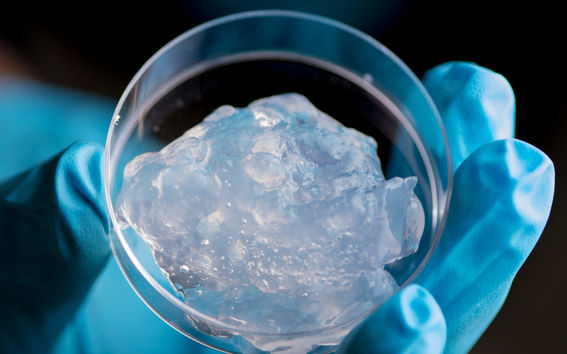Aalto University and Murata Japan are pushing the boundaries of material science

Professor Orlando Rojas is leading a research collaboration on material science and fiber processing with Japan’s Murata Manufacturing Company, a global leading manufacturer of electronics and advanced materials. ‘We work to uncover solutions from nature and to fulfill many of our material needs. This can be done sustainably by looking into one of Finland’s most important resources, the forest. There are great business propositions if wood components and residues from industry are considered,’ he says.
Finland’s forests are not Murata’s foremost interest, but Aalto’s expertise in forest bioproducts and fiber technology provides a unique opportunity for Murata’s innovative developments. ‘Our co-operation concentrates on shape-controlled nano-powdering technology of synthetic polymers. Aalto has deep knowledge in shape-controlled nano-powdering of natural polymers with high-order structures such as cellulose’, says Michinori Nozaki, general manager of new business development at Murata.
Path forward to process new materials
This project grew out of efforts by the City of Espoo to strengthen ties between Japanese businesses and Finland. ´The City of Espoo facilitates communication between Finnish and Japanese universities and companies. Their work, together with group like Business Finland, is extremely useful because they identify needs, establish connections, reach out to people, facilitate communication and help start conversations between different stakeholders,´ says Rojas.
For Aalto’s research team, the goal of the project isn’t to produce an end-material or product but to help Murata create a path forward to process new materials. ‘Developing new material properties demands exploration of new territory. The inherent uncertainty makes this type of research challenging, since most attempts to reach a solution fail, demanding new routes and approaches,’ explains Rojas.
‘For our team, this was a great opportunity to engage researchers in tackling real challenges with real impact. They dissected phenomena that were scientifically inspiring and, at the same time, valuable from the perspective of material development and applications.’
Joint projects like this help Murata create new value and connect university research with the needs of the company. ‘Through close communication together, Murata and Aalto can share the goals of joint research and propose ideas to achieve them,’ says Nozaki.
First-class equipment and tools for experimenting
The co-operation was well-organized and reached common goals. ‘In my view, Finnish and Japanese people have a similar working philosophy – they’re both very methodical and rigorous in what they do. The work proceeded systematically, following a precise time schedule,’ says Rojas.
The experimental work took place in Aalto’s laboratories and facilities at its campus in Espoo. ‘The Department of Bioproducts and Biosystems has excellent research infrastructure and facilities, one of the best globally in this field. The modular equiepment and piloting tools are ideal for this type of co-operation with companies,’ says Rojas. ´The future could bring more of these types of collaborations, with researchers helping companies advance their technologies, materials and methods of fabrication.´
Text: Marjukka Puolakka
For further information, please contact:
Elli Käpylä
Read more news

Register for the Transregional Online Living Labs Day 2026
Join Unite!’s international, online conference to explore how University Campus Living Labs connect research, education and practice.
Hannu Martola appointed as Chair of the Aalto University Alumni Network Board
The board’s new members are Esa Arola, Eila Lindroos and Terttu Sopanen. Continuing members are Ari Bertula, Ossi Leikola, Laura Nikola and Katja Soini.
VTT, Aalto University and GTK: How to ensure Finland captures the multi‑billion growth potential of mineral economy
Finland is rising to the forefront of the mineral economy through new research initiatives and closer collaboration






